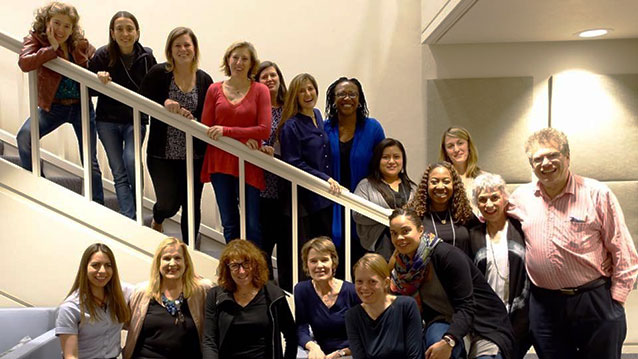EVANSTON, Ill. --- Economist Willlemien Kets has always been a news junkie. So after learning about Northwestern University’s Public Voices Fellowship program, Kets jumped at the chance to connect her research on diversity and identity to current affairs.
The OpEd Project’s Public Voices Fellowship, first launched at Northwestern five years ago, is seeking a new crop of underrepresented voices. First piloted at Yale, Stanford and Princeton universities, the international initiative is expanding across the country to increase the range and quality of ideas heard in the world.
During the yearlong program, Kets, assistant professor of managerial economics and decision sciences at the Kellogg School of Management, was one of 20 full-time faculty members who attended workshops, worked with mentors, wrote commentaries, served as a media expert and submitted her work for publication. The experience left her with a new perspective on her research and a deeper appreciation of the challenges and rewards that come with having her expertise reach much broader audiences.
“You read the news differently and think, ‘what can I say about it?’” said Kets, who specializes in game theory. “Now I feel more synergy between what I do as a researcher and what I do as a citizen.”
The program is open to all active, full-time Northwestern University faculty who have not already participated in a program either at Northwestern or elsewhere. To apply for the 2016-17 class, download the application form and submit all required materials to c-flowers@northwestern.edu by August 15, 2016.
Northwestern’s initiative is led by journalist-mentors Michele Weldon, director of the NU Public Voices Fellowship Program, emerita faculty from Medill, and a senior leader with The OpEd Project. Her co-leader is Holly Kearl, author and senior leader with The OpEd Project.
The 2015-16 class was one of the most prolific groups Northwestern has trained, Weldon said, producing, writing and delivering more than 120 opinion pieces, book reviews, speeches, podcasts, and more across a range of media since November. To date, NU fellows from the past four cohorts have produced more than 630 expressions of thought leadership in outlets from The New York Times to Scientific American and dozens more.
They represented a wide cross section of expertise and experience, including the American arts, pediatric medicine, environmental law, economic decision-making, creativity in music, brain development and function and more.
Throughout the year, the participants attend quarterly seminars on the Evanston campus and are mentored weekly by Weldon and Kearl, who brainstorm, edit and pitch their work to top outlets throughout the country, connecting them to editors directly.
When the fellowship concludes in late July, the faculty fellows have access to The OpEd Project’s national network of mentor-editors. These volunteers, which include Pulitzer Prize winners, genius grant winners, former New York Times editorial board members, war correspondents and nationally syndicated columnists, mentor one fellow a month. Fellows can tap this resource for feedback for a year beyond the program.
Current fellow, Kelly Michelson, associate professor of pediatrics and director of the Center for Bioethics and Medical Humanities at Northwestern University Feinberg School of Medicine, applied for the fellowship to expand her career.
“I wanted to find new ways to be a leader, not just institutionally, but in a broader way,” said Michelson, who has had nine pieces published by major outlets.
Kets wanted to write mostly about her research on identity and diversity. Crain’s Chicago Business published her opinion piece, “A Compelling Case For Hiring Someone on the Autism Spectrum,” which she co-authored with fellow Sarah Bauer, assistant professor of pediatrics at Feinberg. Fortune, meanwhile, published “What This U.S. Supreme Court Justice Gets Wrong About Diversity.”
Kets also challenged herself with a more personal essay called “How Running (Literally) Everywhere Helps Me Cope With Epilepsy.” That piece, she said, was difficult in part because there was no pre-existing template, and she had to re-live some of the emotions she was writing about.
“What seemed to resonate most with readers is the message that fragility can go hand in hand with resilience,” Kets said. “That is something many people could relate to, whether they have epilepsy or not. All in all, it was a more intense experience than writing about my research and very rewarding.”


